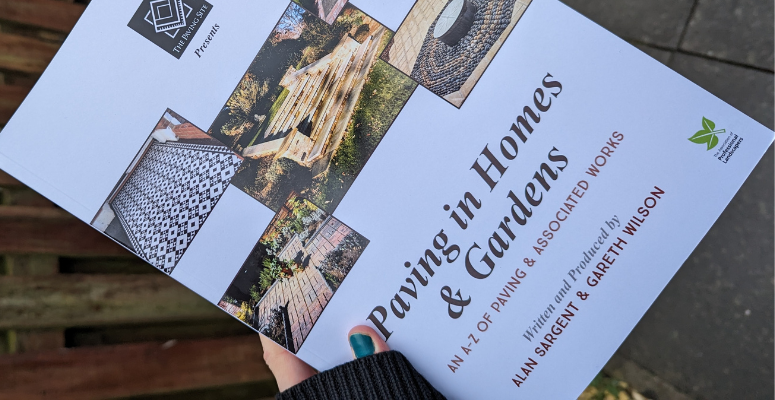Following the launch of their new book Paving in Homes & Gardens: An A-Z of Paving & Associated Works, experts Alan Sargent and Gareth Wilson have been hosting a series of one-day workshop seminars. We visited the most recent, held yesterday at Brinsbury College, and here are the top seven takeways from the day:
1 Ensure you have a “works programme schedule” in place
By storyboarding the entire process from start to finish, you can have open and clear communication with the client.
Update it as you go as well! At the end of the working week, send an update to show what’s been achieved, what’s been changed and what’s still to be done, along with a plan for the next week – this then eliminates any opportunity for the client to say that they weren’t aware.
“Keeping control of the project is the most important thing. Keep control of the project and you’re keeping control of the client,” says Sargent.
With everything written down, every step of the way, you have a paper trail, and your back is covered.
2 Create a site product library
Show the client exactly what will be used within the project and have them sign an agreement. “Once the sample is chosen, remove the rest from the site to avoid any confusion and potential problems,” says Wilson.
Be sure to add to your terms and conditions that the products will differ between batches. Whether it’s hard or soft landscaping, so stone or plants, each batch will be somewhat different than the last.
Have everything written down, plain and simple, and make sure that your client is prepared for this before you order your supplies. And always order on a singular batch number to try and avoid any dissimilarities to begin with.
 3 Ensure you have proof
3 Ensure you have proof
As soon as you arrive on site, be sure to take photos of everything including and not limited to: paint work, fencing, planting, client belongings, and cars.
If you make sure that you have a record of everything before you begin, you can’t be held accountable for any damage that you weren’t responsible for.
Recommendation: Do a slow walk-through video of the entire site with a wide-angle lens. Anything you forget to photograph will then be captured in the video and can be screenshot from within it.
Also, it’s always worth checking with your insurance company if you’re unsure of a project or worried about a certain aspect. “Make sure you’re covered before anything happens,” says Sargent.
4 Be prepared for variation orders
There are two types of variation orders (VO):
- Detrimental VO – which increase the costs for you (the landscaper)
- Beneficial VO – which increase the costs for the client
So, when the client says “can you just add an extra two metres of paving to the area,’ stop and ask yourself: Can you do it? How much will it cost? How much do you need to undo/redo to make it possible? Will it be at cost to you, or to the client?
And don’t be afraid to say no. If the order isn’t within the original signed contract, you should not be expected to carry out any additional work without a new contract and quote being agreed.
5 Weigh up the impact of acceleration packages
This is when the customer pays more in order for you to complete the project earlier. As simple as this may seen to the client, there is far more involved as the landscaper to ensure that you are looking after your team whilst also continuing to complete the work to the highest of standards.
An acceleration package may mean longer working hours, working weekends, or preparation off site. Although these are things that can be done, it must come at a significant cost to the client.
Explain the process of the package, and the changes you will have to make to make it possible. Then it’s up to the customer to decide if it is worth it or not before you have to work with your team to make it happen.
6 There are a lot landscaping scams
According to Wilson, his top three reoccurring clients are currently:
- Solicitors contacting on the behalf of clients who have fallen victim of scams
- Solicitors themselves who have fallen victim of scams
- Police themselves who have fallen victim of scams
Clients are supposedly finding local contractors advertised on social media, then paying cash in hand for the job to be done and are more commonly falling victim to scams as the companies simply don’t exist, either “preparing gardens” for the work, and then leaving, or “completing the project” and leaving it in a worst condition than before.
Fixing these scam projects is becoming the most consistent type of project for Wilson and it is therefore becoming increasingly important to have all of your systems and paperwork in place so that you can provide a trustworthy service every time.
7 The future of paving is green, according to Wilson
More sustainable pavement is to be designed with longevity in mind.
- SuDS and permeable surfaces are to become the go-to.
- More unbound, natural stone setts too.
- Recycled and reclaimed products are growing in popularity.
But, if you were to only take one thing away from this seminar, Wilson would encourage it to be “to do everything 100% right, the first time.”
“Cover all grounds, cover your back and have it in writing,” Sargent adds.




























0 Comments